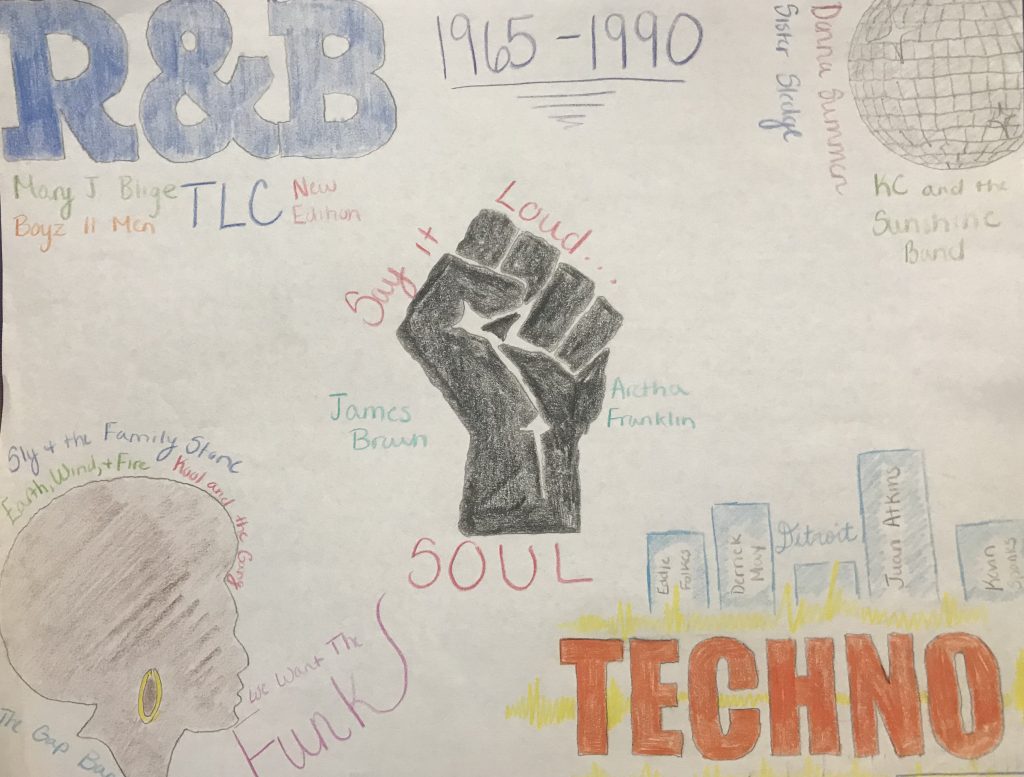The genre name Rhythm and Blues, R&B, replaced the term race records in 1949. These R&B songs first emerged during World War II and the music reflected the social and economic changes in America at the time. Drawing inspiration from blues and jazz, African Americans during World War II and the Second Great Migration took their music to various parts of the country, giving each region its own stylistic flavor. R&B became mainstream and popular with non-African American audiences in the mid 1950s due to advancements in radio. Various recording companies did not like that African American music was generating such popularity with their white audiences that they would have their artists perform the same type of music but under a different genre name: rock and roll. Despite this, R&B music persisted throughout the country. Whether it was Motown music in Detroit or Stax Records in Memphis, R&B was still popular throughout the 60s, 70s, 80s, and 90s with changes in sound and lyrics that better reflected the times.
[embedyt] https://www.youtube.com/watch?v=Xz-UvQYAmbg[/embedyt]
Shortly after the term R&B was coined, Soul music took root as a way for blacks to express themselves in a racially and politically heated America. The Modern Civil Rights Movement and Black Power Movement were the primary cultural and political movements at the time and Soul music was closely associated with these movements. James Brown, known as the “Godfather of Soul” was one of the first, and arguably most popular, Soul artists at the time. His famous song “Say it Loud (I’m Black and I’m Proud)” is just one of the many songs that captures the feelings of pride and comfortability in ones being black in the United States.
[embedyt] https://www.youtube.com/watch?v=2VRSAVDlpDI[/embedyt]
The late 1960s and 1970s was a time of social and economic transition for African Americans. Previously they had restricted rights in the country, endured the Civil Rights Movement to obtain those rights, and then saw the leaders of that movement killed. With so much to think about and consider, African American artists drew inspiration from the jazz and soul genres to create Funk music. African Americans used Funk as a way to express their feelings and talk about social and political topics, social relationships, and just feeling good and having fun. Funk lyrics were often about lighter topics like feeling good, being secure in blackness, or male/female relationships. Some of the most iconic Funk performers include Kool and the Gang, Sly and the Family Stone, Parliament Funkadelic–who wrote and performed “Give up the Funk (Tear the Roof Off)”– and the Bar-Kays. By the mid-1970s, Funk Bands emerged. Some of the most popular are The Gap Band and Earth, Wind, and Fire.
[embedyt] https://www.youtube.com/watch?v=Zu9a29UR2dU[/embedyt]
Disco came about in the United States in the 1970s in New York. African American DJs drew inspiration from underground dance venues from the 1960s. Drawing some inspiration from R&B and the use of technology is how Disco music came to be. Even with Disco music’s widespread success across the country, it still faced opposition from majority social groups. Disco was often associated with homosexuality and blacks and as a result the use of the term disco quickly vanished. A result of Disco music, House music gained popularity just as Disco was fading out of the spotlight. A direct result of Disco and House music, Techno music emerged from Detroit in the 1980s. It utilized electronic instruments and was reflective of the economic downturn and recession of the 80s and persisted into the 90s and 2000s.
[embedyt] https://www.youtube.com/watch?v=6cEbemMQ_OQ[/embedyt]
Even though styles of music changed several times between 1965 and 1990, the purpose of African American music remained the same. These genres, that were uniquely ours, served as a platform for self-expression in a society that constantly tried to silence us. Whether it was talking about pride in our blackness or talking about economic and social hardships, R&B, Soul, Disco & House, and Techno music all persisted. There is evidence of each genre in the genres of music that have become popular today, meaning that these original genres never truly left us.


